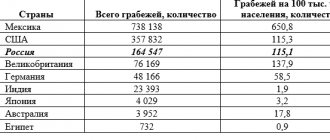Burglary involves secretly entering premises where someone else's property is stored. In the norms of the Criminal Code of the Russian Federation, home burglary is singled out as a separate feature, while the types of other objects and storage locations do not matter. Using hacking to commit theft automatically entails increased sanctions under the Criminal Code of the Russian Federation, and you can read more about this in the presented material.
- Concept and signs of burglary
- Features and types of burglary during theft
- Punishment for burglary
Definition
Theft combined with burglary means the secret theft of someone else's property.
Moreover, such an act is committed with advance intent (that is, according to an action plan). The goal is to obtain illegal benefits. The Criminal Code contains definitions of various types of criminal misappropriation of someone else's property. Important: burglary is the illegal alienation of property, committed secretly from society by entering the premises. Thus, we are talking about a pre-planned criminal act, the result of which is property damage. It is described in Article 158 of the Criminal Code. Such crimes also include the gratuitous secret alienation of goods in favor of third parties.
Download for viewing and printing:
Criminal Code of the Russian Federation dated June 13, 1996 No. 63-FZ
Additional questions
How to protect property from theft
Law enforcement agencies take measures to protect the population from theft. But a lot also depends on the owners of the premises. Necessary:
- strengthen door and window frames;
- use modern locks with several degrees of burglary protection;
- put bars on the windows (if the room is located in the access area from the street);
- do not allow strangers into the apartment;
- do not disseminate information about your financial situation.
Hint: it is better to store especially valuable things and cash:
- in the safe;
- at a banking institution.
How many years do you get for petty theft?
Theft is considered petty when the value of the stolen property does not exceed 2,500 rubles. Very often, petty thefts are committed in hypermarkets by people who do not want to pay for products. The value of the stolen goods is determined according to the average market price. It is important to know that the amount stolen is equal to the purchase price of the goods. The store's promotion does not play any role. Determining the value of stolen goods is necessary in order to qualify a crime under the civil or criminal code. So how many years do you get for theft if the cost of the damage is less than 2,500 thousand rubles? Punishment for such an act is provided for in Article 7.27 of the Code of Administrative Offenses of the Russian Federation. This crime is administrative. The person who committed this act is subject to a fine of one thousand rubles to five times the value of the goods, or arrest for several days, or correctional labor. If petty theft is committed by a minor citizen under 16 years of age, the fine is imposed on the parents.
From all of the above we can conclude that each theft is individual. Therefore, it is impossible to say unambiguously how many years they give for theft. After all, each such act has its own motives, goals and reasons. Each theft has its own qualifying characteristics.
Criminological characteristics
The features of the crime identified by criminologists for their classification are given in the table:
| Sign | Description |
| Place of occurrence | Indoors (apartment) |
| Focus | Against property |
| Aggravating circumstances | Committed by a group of persons |
| Attracting minors | |
| Repeated participation | |
| Causing great harm to the victim | |
| Large amount of theft (250 thousand rubles) |
Hint: the amount of harm and the amount of damage are not identical concepts. The first depends on the financial situation of the victim, the second is calculated as a multiple of the minimum wage.
Qualifying features
Crimes in jurisprudence are described using common features - qualification criteria.
These may vary depending on the identity of the attacker. For example, if the thief is a family member (a person living in the same apartment with the victims), then some of the signs disappear due to natural circumstances. Theft with penetration is characterized by the following features:
- penetration by damaging structures;
- mastery of items of property, including intellectual property;
- possible damage to property, increasing losses.
For information: in addition to apartment thefts, there are other thefts committed by breaking and entering. For example, automobiles.
With penetration (burglary)
Forcible entry into a premises has its own signs, identified during the examination of the crime scene. They are:
- broken (damaged) locks on doors or windows;
- alarm system disabled;
- unauthorized disconnection of the apartment from energy sources.
For information: in law enforcement practice there are more dangerous methods of penetration:
- explosions of door and window openings;
- breaking down walls;
- partial dismantling of ceiling bulkheads, etc.
Hacking is carried out using auxiliary tools, for example, master keys, crowbars, etc. Forcible entry is characterized by damage to areas of a structure for the purpose of committing theft. If nothing is missing, then theft will not be classified.
Other signs
Other signs include the following:
- Committed by a group of persons. These include people: those who entered and removed property;
- prepared auxiliary tools (master keys);
- monitoring the situation outside;
- distracting apartment owners;
- those who conducted surveillance of the crime object and others.
Hint: Damaging property also increases damage.
What to do if your apartment is broken into / robbed
If you are not spared by such an event as theft from your home, you first need to act as follows.
- Try to carefully, so as not to destroy possible remaining traces of the criminals, inspect the premises into which there was penetration in order to establish a complete list of the stolen items.
- After this you need to call the police.
You need to contact the nearest police department serving the area where you live. There is no need to visit the police in person; the application can be made by telephone.
Inspection of the scene of the incident and drawing up a report
After making a telephone message, you need to wait for the employees to arrive and provide them with your home for inspection. Based on the results of the inspection, a protocol of the same name will be drawn up.
Before the inspection begins, the owner of the premises or the person currently living in it must legally give written permission to conduct it.
Before the arrival of the police task force, try to remember the signs of the stolen property (shape, weight of gold items, scratches on the body of the equipment, color of fur coat, size of clothing, cash bills, etc.) in order to create as accurate a description as possible. Make a preliminary assessment of the stolen property.
Writing a theft report to the police
Upon the arrival of the police, the investigator or the person conducting the inquiry will ask you to write a statement about the fact of theft, immediately at your home, or will invite you to testify and draw up a statement at the police department.
The application is drawn up on the prescribed form or in free form. There are no strict requirements for its form.
As a rule it is indicated:
- addressee - the head of the police department of your area, indicating the full name, position and rank of the official;
- applicant - your full name, residential address;
- a list of stolen goods indicating the preliminary cost and amount of property damage caused to you;
- a request is made for the need to search for the stolen person and the unknown persons who committed the theft;
- applicant's signature and current date.
Usually police officials tell you in detail how and what to write, and no difficulties arise with this. If they don't help you, stick to the form suggested above.
The times when law enforcement officers did not register accepted applications or refused to accept them, citing some circumstances, are long gone.
But nevertheless, you need to know that according to the police regulations, after accepting the application, you must be given a numbered notification coupon, which contains information about the acceptance of the application, the official who accepted it, the number and the current date. If you have not received a ticket, your rights have been violated.
Consideration of a burglary complaint
The Russian Criminal Procedure Legislation sets a period of 3-10 days for consideration of your application; in exceptional cases, this period can be extended, but not more than up to 30 days.
Within the specified time frame, the application submitted by you must be considered and a decision made:
- to initiate a criminal case;
- refusal to initiate criminal proceedings;
- about sending an application by territoriality (if you applied to a police department that does not serve your address territorially).
As you can see, the list is not so long. To issue a decision to refuse to initiate a criminal case, police officers need very compelling reasons. In cases of theft of other people's property, this is, as a rule, an underestimation of the stolen property.
When committing qualified theft, which includes theft from premises and especially from a home, this amount may be less. The main thing is that it does not fall under the concept of insignificance, which is regulated by Article 14 of the Criminal Code of the Russian Federation.
And if the amount is significantly more than the specified amount, a criminal case will definitely be initiated, and you will definitely be notified about it.
An assessment of the stolen property, based on your testimony, is done in specialized institutions at the request of the police. If you do not agree with this assessment, you can order an assessment from a similar company yourself.
Signs of a staged burglary
Law enforcement officers sometimes encounter staged crimes.
Both criminals and premises owners take such action. The goal of the former is to obtain money from the accused person, the latter, as a rule, are trying to hide a more serious act. The signs of a staging are well known to criminologists. They are:
- absence of fingerprints on furnishings, frames, doors, etc.;
- leaving valuables in place;
- lack of recording of robbers on surveillance cameras and more.
Example: thieves took jewelry from a safe, but left stacks of banknotes untouched.
Illegal entry into a home: judicial practice
Please note that arrest is also possible. Only when violence or threats are used when entering someone else’s home will it be greater than with a regular “invasion.” Such an act is punishable by arrest for no more than 24 months. A quite common measure for illegal entry into a home. Judicial practice indicates that in addition (without relying on Article 139 of the Criminal Code of the Russian Federation) moral damages are recovered from the violator.
Approximately 200,000 rubles. This is the average that victims request. The court independently assigns compensation for moral damage or satisfies the plaintiff’s request in certain cases. An attempt to illegally enter a home (as well as the direct implementation of this violation) using one’s official position is a terrible thing.
In court it will be punished at the highest level. Often, instead of this measure, a fine is imposed (up to 300 thousand rubles or in the form of the income of the accused for a period not exceeding 2 years). What penalties are provided for illegal entry into a home? This kind of offense happens very often. But, despite the laws, it is not always punished.
In judicial practice, there are sometimes situations where illegal entry into a home is completely ignored. But more on that a little later. What is the penalty for our violation today? What to expect when invading someone else's territory? The maximum allowed by law is 3 months.
If someone has illegally entered your property, you have the right to go to court and demand the arrest of the culprit. Maximum for 3 months. The exact date will be determined during the trial.
If there are aggravating circumstances, of course, it can be increased. This practice occurs frequently. What is the Punishment for Opening the Locks of Private Property
Read on the Russia-Ukraine website:
- What Real Estate Cannot Be Transferred to Operational Management
- Which Source of Payment Must Be Indicated in the Declaration When Selling an Apartment
- What kind of property is an Apartment Purchased with a Military Mortgage?
- What is the expiration date of land surveying documents?
- Which 2 personal income taxes are needed for Property Deduction?
Attention!
Due to recent changes in legislation, the legal information in this article may be out of date! Our lawyer can advise you free of charge - write your question in the form below.
Distinction from related crimes
The theft is carried out secretly. Only the property of the homeowners is at risk. Do not confuse theft with robbery or assault . The last two crimes are also committed with the aim of seizing valuables. However, they are characterized by openness, that is, the victim sees the attackers. In addition, the victim’s life and health are at risk from robbers. Hint: if the thieves, having entered the apartment, encountered the owners and used violence against them, then robbery will be classified. And this is a different article.
Illegal entry into a home (art.
The Criminal Code identifies illegal entry with the concept of “intrusion unauthorized in accordance with the procedure provided for by law.” It is also considered unlawful to enter the premises without the knowledge or consent of the victim, use the area in his absence, unlawful search, eviction and other similar actions that violate the inviolability of the space. Illegal entry into a home (Article 139) by its design refers to formal offenses. Accordingly, the act will be considered completed at the moment of invasion of the premises.
According to the resolution of the plenum of the Supreme Court, which clarifies some issues regarding the application of Art. 23 and 25 of the Constitution, courts must consider materials proving the need to enter residential premises and make an appropriate decision. In Art.
165 of the Code of Criminal Procedure provides for the right of the investigator to carry out a search immediately if such a need is caused by the circumstances of the case. At the same time, he is obliged to notify the judge after carrying out such actions. A search conducted in such situations cannot be qualified as illegal. This is primarily due to the fact that the Code of Criminal Procedure acts as a federal regulatory document. Secondly, a search carried out in extreme circumstances, not previously agreed upon by the judge, but subsequently confirmed by him, cannot be considered unlawful.
If violent actions were accompanied by harm of moderate severity, as well as severe damage to health, as well as the death of the victim, the act is additionally covered by Art. 111, art. 112 or 105. A threat is a warning of the intention to cause damage, bodily harm, battery, or death. At the same time, additional qualifications under Art.
119 is not required. An additional object of encroachment under the second commented article is social relations that ensure the inviolability of personality and health, as well as the individual freedom of a citizen. Subjects of crimes established in Part 1 and Part 2 of Art. 139, can be any sane person over 16 years of age. The culprit is aware that by his behavioral acts he is violating the constitutional right to the inviolability of housing, understands the social danger of the act and wants the appropriate consequences to occur.
The limits and grounds for restricting the constitutional rights of persons are established by Art. 11 clauses 18 and 24 of the Law “On the Police” (adopted during the period of the RSFSR) as amended by the Federal Law of 1993, as well as Art. 6, 7 and 9 of the Federal Law regulating operational investigative activities, the Code of Criminal Procedure, paragraph “e” of the Federal Law regulating the activities of federal state security agencies with additions and amendments introduced into it by the Law of July 1, 1993. The latest regulatory document has become invalid due to the adoption Federal Law No. 40.
Punishment and responsibility
The severity and guilt of the suspects is determined by the court. The following measures of influence on the thief are prescribed:
- penalties in the amount of 100 to 500 thousand rubles. or alienation of the thief’s income for three years;
- forced labor for up to five years;
- imprisonment for up to one and a half years.
Attention: the following persons are exempt from liability:
- declared insane (incompetent);
- under fourteen years of age.
Minors
If the crime was committed by a minor child (over 14 years old), then he also faces punishment. Depending on the severity of the crime, the young man faces up to three years in prison . These criminals serve their sentences in specialized (children's) institutions of the criminal correctional system. Important: penalties are imposed on the parent (official representative) of the minor.
What follows for burglary if there has already been a criminal record?
The commission of a criminal act by a convicted citizen is recognized as an aggravating circumstance. More stringent measures apply to him:
- imprisonment for up to six years;
- fine up to 800 thousand rubles;
- restriction of freedom for up to one and a half years.
Hint: if the theft is particularly large, the term can be extended to 10 years.
Liability for false testimony
If an attacker provides false information about an uncommitted crime, he may incur criminal liability (section 306 of the Criminal Code):
- fine up to RUB 120,000.0;
- compulsory work up to 480 hours;
- correctional labor for up to 2 years;
- others.
Hint: a false call to law enforcement leads to administrative liability.
Factors influencing sentence
When making a decision, the court examines all the nuances of the case. The following factors influence his final decision:
- presence of: preliminary agreement between persons, including tacit agreement;
- other aggravating circumstances;
- kidnapped;
Hint: the sentence is commuted if the injured party voluntarily compensates the damage.
What belongs to aggravating circumstances
The court considers the following circumstances of the case to be aggravating:
- high value of stolen goods;
- causing major damage to the victim;
- group conspiracy;
- the thief has an outstanding criminal record;
- involvement of minors in criminal activities;
- the use of weapons and explosives in the process of criminal activity;
- fraud;
- threats.
Hint: repentance softens the sentence.
Arbitrage practice
Example 1 .
Ivankov S. divorced his wife and harbored a grudge against the woman. After waiting for her to leave for a neighboring town, he drove a car to her house and entered the premises. He didn't have the key, so the door had to be broken down. He took out valuables worth RUR 100,000.0, loaded them into the vehicle and drove off. He was fully aware of the criminality of his act. The woman's neighbors called the police. Ivankov fully realized his guilt and returned the valuables. The crime is classified under paragraph “a” of the third part of paragraph 158 of the Criminal Code. The court imposed a sentence of 2 years' imprisonment. Taking into account Article 73 of the Criminal Code, the term was considered suspended.
Example 2 . A fence net worth RUR 10,000.0 was stolen from Sidorova’s dacha. She reported this to law enforcement agencies. Then she independently found out that the thieves were her brother’s friends. The missing property was found at his home. However, a previously convicted friend threatened the young man to write a confession. The woman did not want her loved one to go to prison and turned to a lawyer.
The specialist explained that in this case the fact of kinship can be used. Since she is recognized as a victim, she can formalize reconciliation with her brother. The case will be dismissed either at the preliminary stage or in court.
What is the article of the Criminal Code of the Russian Federation for theft with penetration?
Theft with penetration is a qualified element of Article 158 of the Criminal Code of the Russian Federation, part two of which provides for liability specifically for the commission of this act.
Entry may be committed under criminal law in the following places:
- Room.
- Other storage (tank, locked cabinet located on private property, hangar, etc.).
- Housing.
Let us give a few examples for clarity and then below we will consider information on liability for this type of crime.
Theft with illegal entry into a home (burglary)
In criminal law, housing is understood as the place of permanent or temporary residence of a person. Such objects undoubtedly include:
- Private house, apartment, dorm room and so on.
- If a person constantly uses a dacha for living, which is equipped with everything necessary for this (electricity, water supply, gas, etc.), such a place will also be recognized as a home.
- Housing will also be a hotel room where a person stays at least for a short time.
- Also, the dwelling must include a compartment on the train and a cabin on the ship for the period of the citizen’s movement along the route.
Liability for committing theft by entering a home is established by paragraph “A” of Part 3 of Article 158 of the Criminal Code of the Russian Federation. The crime is classified as serious. The punishment will also correspond to it.
Example 1. Citizen S. is looking at a large house in a populated area, finds out from neighbors that an entrepreneur lives in this house, and sees an expensive car near the house.
During the daytime, when there are no residents in the house, S. gets inside through an open window in a room of the house and steals money and gold items worth 150,000 rubles.
S.’s actions will be qualified as theft committed with penetration into a home under Article 158 Part 3 of the Criminal Code of the Russian Federation.
If a subject enters a home legally, for example, was invited as a guest and subsequently steals gold, then his actions cannot be classified as committed with illegal entry into the home (his presence in the apartment or house was initially legal, the intent arose later , when he saw gold jewelry unattended).
In this case, the citizen will be charged under another part or another paragraph of Article 158.
Illegal entry and theft by a group of persons
Burglary can be committed either alone or by a group of persons by prior conspiracy.
- A group of persons in this case will be a group of 2 or more people.
- Preliminary conspiracy means pre-planned actions of group members to commit a criminal act. In this case, burglary.
Example 2. F. and S. agreed to commit theft from a certain garage. At night, having broken through the brickwork of the garage, F. and S. entered the premises and committed theft of property in the amount of 35,000 rubles, causing damage in the corresponding amount by their actions.
The actions of F. and S. were qualified as theft committed by a group of persons by prior conspiracy; they will be prosecuted under points “A”, “B” of part two of Article 158 of the Criminal Code of the Russian Federation.
Secret entry into the store and its robbery
This is a very common theft. But it is necessary to distinguish the thefts that occur every day in supermarkets when visiting them, from a well-planned and premeditated burglary.
Example 3. V. and T., having agreed in advance, prepared to commit theft from the Horns and Hooves store.
At night, after squeezing the plastic window of the store, they got inside and stole goods worth 70,000 rubles.
The actions of these persons will also be qualified under points A and B of part two of Article 158 of the Criminal Code of the Russian Federation. Theft was committed by entering the store premises.
Unlike the simple theft of goods from a counter, burglary, in addition to the method of commission, is also distinguished by the social danger of the act committed. Therefore, the more “professional” the theft, the higher the degree of its social danger and the punishment, respectively.
Theft of apartment keys
Many people are interested in the question of whether stealing apartment keys is a crime. It depends for what purpose these keys were stolen.
If the subject of the theft simply wanted to annoy the homeowner (to take revenge, make a joke, etc.) and simply kept them for some time, and then returned them, planted them, or simply threw them out, then such actions do not form any corpus delicti.
There is no such sign of theft as mercenary intent, and the cost of the stolen keys is an insignificant amount to “pull” the initiation of a criminal case.
It’s another matter if the keys were stolen for a specific purpose - to commit theft from a residential premises or to transfer the keys to third parties to commit the same theft.
- In the first case, theft of keys will be considered as preparation to commit a crime and will be qualified under Part 1 of Article 30, Part 3 of Art. 158 of the Criminal Code of the Russian Federation.
- If your intent was to transfer the keys to someone so that they could commit theft, then your actions will be qualified as complicity in theft. The person will be an accomplice and brought under Article 158 Part 3 of the Criminal Code of the Russian Federation.








